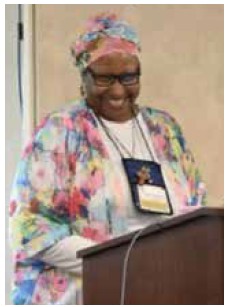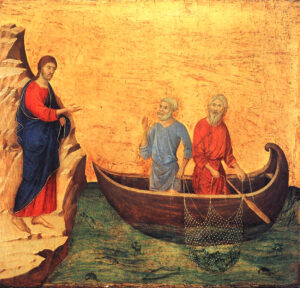Carolyn Townes, OFS: Peacemaker and Circle Keeper JPIC 2025 Award
(This article originally appeared in the TAU-USA Fall 2025 Issue #117)
By Joe Makley, OFS • JPIC Animator
Our JPIC Award recipient for 2025 is Carolyn Townes, OFS. Carolyn has had a long and impactful history as the National JPIC Animator for over ten years, and currently serves on the boards of several Franciscan organizations. What follows is a brief interview with Carolyn:
Carolyn, how did you become aware of your Franciscan vocation?

Carolyn Townes, OFS JPIC Award 2025
“The Franciscan Holy Spirit met me at a time in my life when I was unknowingly searching. My Baptist preacher mother would buy these candles to bring good luck to our home. She would always get St. Michael the Archangel, St. Jude, St. Clare, and St. Anthony. I knew who Michael and Jude were, but who were these two in the brown robes? I Googled, even before there was Google, and found out they followed this guy named Francis. So, I went down a rabbit hole to discover who this Francis was. I joined the Catholic Church in 1997, began formation in 1998, and was professed in 2000. So, Francis found me at a time when I needed to be found but had no idea I was lost.”
You’ve described yourself as a circle keeper. Can you explain?
“A circle keeper is one who keeps what goes on in the circle – the stories, the tears, the anger, the uncertainty, the long-held family secrets. As well as making sure those within the circle feels safe, heard, and held. Being a circle keeper embraces the spirituality of “with-ness” – not fixing or having the answers, just being with and listening. Two very difficult things to do sometimes. Circle keeping is in my Cherokee roots and I have had many opportunities to fully embrace it.”
You have worked with Franciscans International, Franciscan Action Network, and other Franciscan organizations. How do we build the bridges with a wider Franciscan Family?
“As Franciscans, we are all one family – friars, sisters, and laity. We all profess the same Gospel written specifically into our own rules of life. We all take the same aspect of Jesus our Brother – as the poor Christ, the Incarnational Christ – and weave that charism into our lives. We are all woven from that same cloth. How can we not stand on the same foundation with one another? When you are standing shoulder to shoulder next to someone, how can you not turn to them and ask, “So, what’s your story? Tell me what breaks your heart!” We have learned to live and move in our own individual silos and that has not been good for building bridges. To build bridges we need to step outside of those silos, turn to one another and get over the fears that separate us. Several of the organizations I work with have never had a Secular Franciscan on their board, team, or committee; let alone a Secular who is a woman of color.”
Can you share any future plans?
“Broken hearts usually dictate my future. As long as there are hearts that are broken, I will always have something to do. I also work to train the trainers for circle processes. Circles are our past, our present, and our future. Circles are what will shift us from fear to love, if we only get out of the way.”
What keeps you going?
“What keeps me going is knowing there are still hearts that are broken and people that are suffering. Those people and hearts need to be tenderly held and allowed the space and the grace to heal. Today’s society is hurting. We live in a world of uncertainty and that uncertainty causes fear. People are living out of their fears and hurts with very few who will listen and hold space for them. I hold space by creating circles. Those circles are spaces for being heard and for the Holy Spirit to begin the healing process.”
https://www.secularfranciscansusa.org/2026/01/carolyn-townes-ofs-peacemaker-and-circle-keeper-jpic-2025-award/
The Gospel Through a Franciscan Lens – 3rd Week in Ordinary Time – Fr. Christopher
Jesus’ message, “Repent, the Kingdom of Heaven is close at hand.” More than sorrow for sin, repent calls for a change of mind, not just in an intellectual sense, but a change involving a transformation of attitude at a deep, personal level, to be prepared to look at one’s life and one’s hope for the future in a totally new way.

https://www.secularfranciscansusa.org/2026/01/the-gospel-through-a-franciscan-lens-3rd-week-in-ordinary-time-fr-christopher/